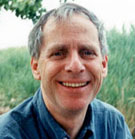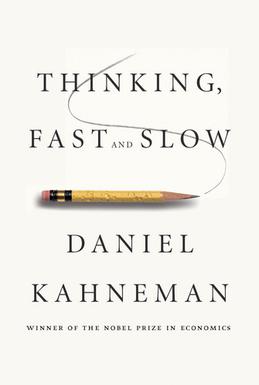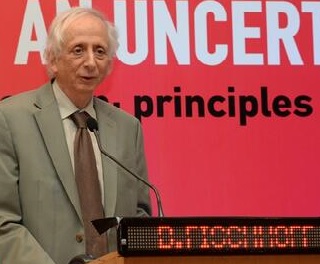Related Research Articles
Cognitive psychology is the scientific study of mental processes such as attention, language use, memory, perception, problem solving, creativity, and reasoning.

A cognitive bias is a systematic pattern of deviation from norm or rationality in judgment. Individuals create their own "subjective reality" from their perception of the input. An individual's construction of reality, not the objective input, may dictate their behavior in the world. Thus, cognitive biases may sometimes lead to perceptual distortion, inaccurate judgment, illogical interpretation, and irrationality.
A heuristic, or heuristic technique, is any approach to problem solving that employs a practical method that is not fully optimized, perfected, or rationalized, but is nevertheless sufficient for reaching an immediate, short-term goal or approximation. Where finding an optimal solution is impossible or impractical, heuristic methods can be used to speed up the process of finding a satisfactory solution. Heuristics can be mental shortcuts that ease the cognitive load of making a decision.

Daniel Kahneman was an Israeli-American author, psychologist and economist notable for his work on hedonic psychology, psychology of judgment and decision-making. He is also known for his work in behavioral economics, for which he was awarded the 2002 Nobel Memorial Prize in Economic Sciences. His empirical findings challenge the assumption of human rationality prevailing in modern economic theory.

Amos Nathan Tversky was an Israeli cognitive and mathematical psychologist and a key figure in the discovery of systematic human cognitive bias and handling of risk.
Behavioral economics is the study of the psychological, cognitive, emotional, cultural and social factors involved in the decisions of individuals or institutions, and how these decisions deviate from those implied by classical economic theory.
The representativeness heuristic is used when making judgments about the probability of an event being representional in character and essence of known prototypical event. It is one of a group of heuristics proposed by psychologists Amos Tversky and Daniel Kahneman in the early 1970s as "the degree to which [an event] (i) is similar in essential characteristics to its parent population, and (ii) reflects the salient features of the process by which it is generated". The representativeness heuristic works by comparing an event to a prototype or stereotype that we already have in mind. For example, if we see a person who is dressed in eccentric clothes and reading a poetry book, we might be more likely to think that they are a poet than an accountant. This is because the person's appearance and behavior are more representative of the stereotype of a poet than an accountant.
The conjunction fallacy is an inference that a conjoint set of two or more specific conclusions is likelier than any single member of that same set, in violation of the laws of probability. It is a type of formal fallacy.

Thomas Dashiff Gilovich an American psychologist who is the Irene Blecker Rosenfeld Professor of Psychology at Cornell University. He has conducted research in social psychology, decision making, behavioral economics, and has written popular books on these subjects. Gilovich has collaborated with Daniel Kahneman, Richard Nisbett, Lee Ross and Amos Tversky. His articles in peer-reviewed journals on subjects such as cognitive biases have been widely cited. In addition, Gilovich has been quoted in the media on subjects ranging from the effect of purchases on happiness to people's most common regrets, to perceptions of people and social groups. Gilovich is a fellow of the Committee for Skeptical Inquiry.

The simulation heuristic is a psychological heuristic, or simplified mental strategy, according to which people determine the likelihood of an event based on how easy it is to picture the event mentally. Partially as a result, people experience more regret over outcomes that are easier to imagine, such as "near misses". The simulation heuristic was first theorized by psychologists Daniel Kahneman and Amos Tversky as a specialized adaptation of the availability heuristic to explain counterfactual thinking and regret. However, it is not the same as the availability heuristic. Specifically the simulation heuristic is defined as "how perceivers tend to substitute normal antecedent events for exceptional ones in psychologically 'undoing' this specific outcome."

Anne Marie Treisman was an English psychologist who specialised in cognitive psychology.
Linda B. Smith is an American developmental psychologist internationally recognized for her theoretical and empirical contributions to developmental psychology and cognitive science, proposing, through theoretical and empirical studies, a new way of understanding developmental processes. Smith's works are groundbreaking and illuminating for the field of perception, action, language, and categorization, showing the unique flexibility found in human behavior. She has shown how perception and action are ways of obtaining knowledge for cognitive development and word learning.
Shelley Elizabeth Taylor is an American psychologist. She serves as a distinguished professor of psychology at the University of California, Los Angeles. She received her Ph.D. from Yale University, and was formerly on the faculty at Harvard University. A prolific author of books and scholarly journal articles, Taylor has long been a leading figure in two subfields related to her primary discipline of social psychology: social cognition and health psychology. Her books include The Tending Instinct and Social Cognition, the latter by Susan Fiske and Shelley Taylor.
In psychology, the human mind is considered to be a cognitive miser due to the tendency of humans to think and solve problems in simpler and less effortful ways rather than in more sophisticated and effortful ways, regardless of intelligence. Just as a miser seeks to avoid spending money, the human mind often seeks to avoid spending cognitive effort. The cognitive miser theory is an umbrella theory of cognition that brings together previous research on heuristics and attributional biases to explain when and why people are cognitive misers.
Attribute substitution is a psychological process thought to underlie a number of cognitive biases and perceptual illusions. It occurs when an individual has to make a judgment that is computationally complex, and instead substitutes a more easily calculated heuristic attribute. This substitution is thought of as taking place in the automatic intuitive judgment system, rather than the more self-aware reflective system. Hence, when someone tries to answer a difficult question, they may actually answer a related but different question, without realizing that a substitution has taken place. This explains why individuals can be unaware of their own biases, and why biases persist even when the subject is made aware of them. It also explains why human judgments often fail to show regression toward the mean.
Heuristics is the process by which humans use mental shortcuts to arrive at decisions. Heuristics are simple strategies that humans, animals, organizations, and even machines use to quickly form judgments, make decisions, and find solutions to complex problems. Often this involves focusing on the most relevant aspects of a problem or situation to formulate a solution. While heuristic processes are used to find the answers and solutions that are most likely to work or be correct, they are not always right or the most accurate. Judgments and decisions based on heuristics are simply good enough to satisfy a pressing need in situations of uncertainty, where information is incomplete. In that sense they can differ from answers given by logic and probability.

Thinking, Fast and Slow is a 2011 popular science book by psychologist Daniel Kahneman. The book's main thesis is a differentiation between two modes of thought: "System 1" is fast, instinctive and emotional; "System 2" is slower, more deliberative, and more logical.

Eldar Shafir is an American behavioral scientist, and the co-author of Scarcity: Why Having Too Little Means So Much. He is the Class of 1987 Professor in Behavioral Science and Public Policy; Professor of Psychology and Public Affairs at Princeton University Department of Psychology and the Princeton School of Public and International Affairs, and Inaugural Director of Princeton’s Kahneman-Treisman Center for Behavioral Science and Public Policy,.

Baruch Fischhoff is an American academic who is the Howard Heinz University Professor in the Institute for Strategy and Technology and the Department of Engineering and Public Policy at Carnegie Mellon University. He is an elected member of the (US) National Academy of Sciences and National Academy of Medicine. His research focuses on judgment and decision making, including risk perception and risk Analysis. He has numerous academic books and articles. Fischhoff completed his graduate education at the Hebrew University of Jerusalem under the supervision of Daniel Kahneman and Amos Tversky.
Intuitive statistics, or folk statistics, is the cognitive phenomenon where organisms use data to make generalizations and predictions about the world. This can be a small amount of sample data or training instances, which in turn contribute to inductive inferences about either population-level properties, future data, or both. Inferences can involve revising hypotheses, or beliefs, in light of probabilistic data that inform and motivate future predictions. The informal tendency for cognitive animals to intuitively generate statistical inferences, when formalized with certain axioms of probability theory, constitutes statistics as an academic discipline.
References
- 1 2 "Barbara Tversky Receives Kampé de Fériet Award". APS Observer. 33. 2020-06-29.
- ↑ "Barbara Tversky, Stanford University Faculty Profile" . Retrieved 2019-09-12.
- ↑ "Barbara Tversky, Teachers College, Columbia University Faculty Profile". Archived from the original on 2009-05-27. Retrieved 2009-03-14.
- ↑ "FABBS :: In Honor Of... Barbara Tversky" . Retrieved 21 September 2016.
- ↑ "Amos Tversky, leading decision researcher, dies at 59". Archived from the original on 2021-03-03. Retrieved 2021-10-14.
- 1 2 Jr, Robert D. Hershey (2024-03-27). "Daniel Kahneman, Who Plumbed the Psychology of Economics, Dies at 90". The New York Times. ISSN 0362-4331 . Retrieved 2024-03-27.
- ↑ "Daniel Kahneman on Why Our Judgment is Flawed — and What to do About It (People I (Mostly) Admire Ep. 27)".
- ↑ "Interview with Daniel Kahneman". Interviews with Max Raskin. Retrieved 2023-01-09.
- 1 2 "Interview with Barbara Tversky". Interviews with Max Raskin. Archived from the original on 2021-07-27. Retrieved 2021-07-27.